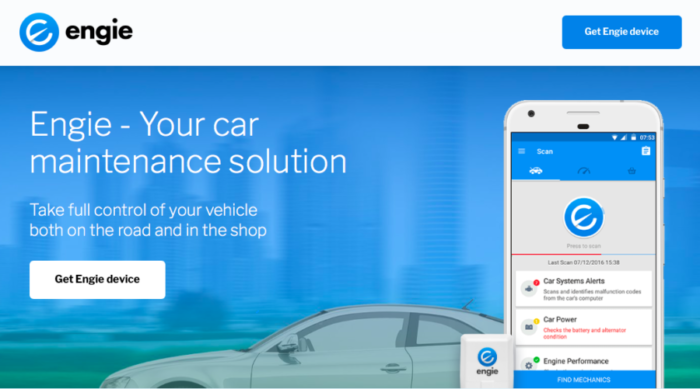Engie, an Israel-based startup offering a car diagnostics device and app is launching in the UK today. It enables users to get an improved understanding of the health of their car and features a tie-up with a marketplace for local mechanics.
The pricing is set at £14.99 for Android users and £19.99 for iOS. Its functioning looks something like this: the Bluetooth device works by plugging into the car’s on-board computer, and through the accompanying Engie app diagnoses what might be wrong with a user’s vehicle, or what repairs might be in the pipeline. This diagnosis ranges from engine malfunctions, emission and fuel consumption, to battery condition and maintenance information.
It then takes that information (hence processing the various data points that a car’s diagnostic ‘black box’ already monitors) and connects the user to the Engie after-market mechanic marketplace, which welcomes a user with helpful features like reviews and price comparisons for any work and parts required, so nobody needs to go through the whole process feeling blindsided.
Once it detects a specific malfunction, the Engie app gets to work alerting local repair shops in its marketplace, who assess the problem and send back a quote for required work. This also becomes the foundation for the startup’s business model: it charges a 6 percent commission on each job booked via the app.
There is, however, one prerequisite: The device claims to work with any car manufactured from 2002 except diesel cars, which are supported from 2005.
In June last year, Yarden Gross, the co-founder, and CEO of Engie said that the inspiration for the startup came from his own life, more specifically the frustration he felt at being putty in the hands of mechanics and the auto industry each time there was something wrong with his car. Not knowing whether his ignorance about the exact repair mechanics was being taken advantage of, he decided there was a need for better technology and a more transparent marketplace, and thus thought of the idea for Engie.
Gross also said that, since each manufacturer or car model has different diagnostics interfaces and data points, producing a universal diagnostics card and app is non-trivial, and involves a certain amount of reverse-engineering and accumulation of auto industry data.
Since its launch in 2015, the company claims 100,000 registered users and works with 200 mechanics in Israel.
